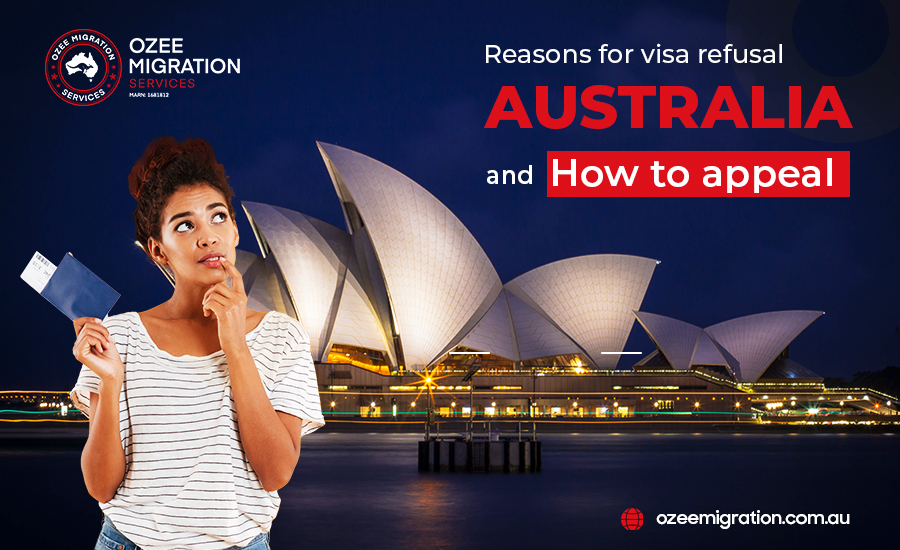Reasons for Visa Refusal Australia and How to Appeal

The Australian Government has strict rules for people on how to apply for a Visa. The most common reason for refusal of visa is failure to comply with these rules. However, there are many cases when people get refused their visa without any explanation from the government or without any access to appeal the decision provided by the government. This article lists reasons and procedures in which someone can appeal against a visa refusal.
Visa appeals are an option for some. You may not be eligible for other visas, but you can still appeal it. Whether your appeal is accepted depends on several factors, as discussed below!
 I applied for an Australian Visa and was denied
I applied for an Australian Visa and was denied
Most visa applications are denied because the applicant did not meet the requirements.
Here are some of the most common visa refusal reasons
- Don’t forget to keep your passport before travelling! The Australian government won’t allow you to enter the country if your passport is expired. This can be difficult or even risky because they won’t allow entry unless they know your information is accurate.
- A lot of applications that meet various visa requirements usually go through, but some will be denied at visa and other stages if they are incomplete.
- A visa could be rejected on character grounds if it is felt that the person doesn’t meet the Australia’s standards. In case your visa is denied, you might not be given another one.
- If you don’t submit a required document then your request will be denied.
- If you are going to apply for an Australia visa, your visa application has to be accurate. If it’s found that you’re providing false information, your request may not work out.
- The Immigration Office may require additional documents or information from you.
- If you fail to answer these requests, it could lead to delays in your visa process.
- In order to be granted a visa, you should provide proof that you can financially support yourself. It’s important for the Immigration Office to know if you are capable of doing so.
- In some cases, health insurance is mandatory for certain visas or immigration applications. For example, if you are applying for a PR and don’t have health insurance to cover your stay in Australia with you, your application will be refused by the Immigration Services.
If you are denied entry to Australia, you will be able to appeal. Here’s how:
Visa refusal happens when you do not meet the requirements for a visa. This is one of the most common reasons for a refusal. If you have been denied a visa for an Australian entry, you can apply to have your visa decision reviewed. This is done by submitting an application, usually with supporting evidence (e.g. documents or letters), to the Department of Home Affairs.
If your visa application for Australia is denied, you’ll need to follow these steps before submitting another appeal:
Showing Appeal To AAT
If your visa application is denied, you have to show your appeal at the Administrative Appeals Tribunal (AAT). You can apply for the AAT by visiting their official website – or alternatively send in a paper application. If you have a sponsor/nominator, they can apply on your behalf.
There is a very limited amount of time within which you can file an appeal, so you will want to make sure that your request is in writing within 28 days of the decision notice. Unfortunately, the Immigration Office or AAT cannot extend the time limit for missing your visa expiration. If you’re an immigrant and in immigration detention, you only have 7 days to submit your appeal.
Your visa might be rejected because it’s not appropriate, or because of what type of visa you applied for. Whatever the reason your appeal might take longer than the appeal times on average. In the written notice, you’ll have all the information you need to appeal if your visa application is refused. You have time until the deadline to start working on an appeal.
Pay The Appeal Fee
There’s a charge of AUD1,826 to get a check-in on an application and the reduced fee is up to 50% if you’re facing financial difficulty. You need to submit your appeal request before the deadline expires and make sure you pay the fee before you leave. The payment can be made through credit cards, cheques, money orders, and an electronic funds transfer at point of sale (EFTPOS). If you don’t receive the decision you were hoping for, the AAT can refund your fees. If there is a positive decision, you will either get your full fee back or a reduced refund amount called 50%; they will provide you with details on how to process and receive your funds.
Here’s How You Can Check to Make Sure Your Appeal Was Sent:
Any time you apply for an appeal, you’ll be sent a letter confirming that they have received your application. You should look forward to receiving an email in a couple of days so you can find out what will happen next.
Here are the documents you’ll need to submit for your appeal.
Typically, after you submit an application for your appeal, you will not need to send any additional documents. The AAT will contact the Department of Foreign Affairs to let them know you have submitted a request for a visa appeal and then they will send all your relevant documents. Sometimes, the AAT may ask you for additional information after you submit your application.
On average, the time required for processing different visas is as follows:
- Visitor Visa: 729 days
- Student Refusal: 530 days
- Student Cancellation: 450 days
- Family Visa: 618 days
- Temporary Work Visa: 885 days
- Partner Visa: 784 days
- Permanent Business Visa: 933 days
- Bridging Visas: 19 days
- Skilled Work Visas: 578 days
To apply for a new visa, you will need to file appeal:
If denied, you can file an appeal with the embassy and apply for another visa. However, you should first apply for a visa appeal, and if it’s easy to fix the problem then your appeal request will change the rejection decision. If for some reason you don’t get a visa, you can apply for another one.
If your visa was denied because you failed the character test for Australia, then you may have been banned from applying again for another visa.
In case you don’t Agree with the AAT decision:
If your visa application was rejected by the AAT, you may be able to appeal the decision or even file a lawsuit.
Obligatory Australia Visa Refusal
If the applicant has served a full-time sentence in prison, the Department of Foreign Affairs is legally obligated to deny the application. If the applicant is currently serving a sentence in prison, and/or has served a sentence in prison within the last five years, the Department of Foreign Affairs is legally obligated to deny the application.
Final Verdict
It is often best to prepare ahead of time so that you don’t make any mistakes with your visa application. However, it is possible to appeal a decision if the decision was made on an incorrect basis or there’s been a mistake in the process. We hope that this guide will help you understand the process and make sure that your last chance appeal is successful. Ozee migration can guide you through the process if you are looking for a last-chance appeal option.
Recommended Read: 10 Questions You Must Ask Your Migration Agent
Recent Posts
 TSS 482 Visa: How to Get Permanent Residency?March 29, 2024
TSS 482 Visa: How to Get Permanent Residency?March 29, 2024 How to Navigate Work Conditions on an Australian Student Visa?February 29, 2024
How to Navigate Work Conditions on an Australian Student Visa?February 29, 2024 820 Visa vs. 309 Visa: Which Partner Visa Option Suits You Better?October 23, 2023
820 Visa vs. 309 Visa: Which Partner Visa Option Suits You Better?October 23, 2023 491 Visa for Skilled Workers: Key Industries and Job OpportunitiesOctober 13, 2023
491 Visa for Skilled Workers: Key Industries and Job OpportunitiesOctober 13, 2023 How a Migration Agent Can Shape Your Educational Journey?September 14, 2023
How a Migration Agent Can Shape Your Educational Journey?September 14, 2023